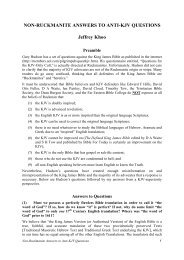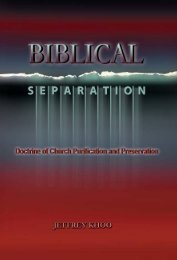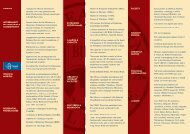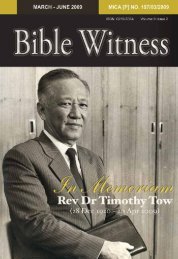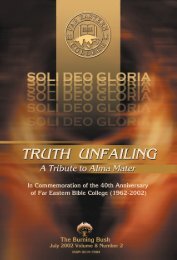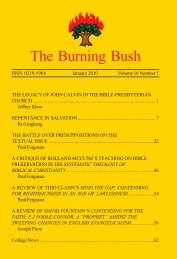The Burning Bush Vol 9 No 2.pmd - Far Eastern Bible College
The Burning Bush Vol 9 No 2.pmd - Far Eastern Bible College
The Burning Bush Vol 9 No 2.pmd - Far Eastern Bible College
Create successful ePaper yourself
Turn your PDF publications into a flip-book with our unique Google optimized e-Paper software.
FILIAL PIETY AND BURIAL CUSTOMS<br />
<strong>The</strong> non-Christian Chinese also see the performing of these rites as their<br />
final farewell and obligation to the deceased. <strong>The</strong>y wish for the deceased<br />
to have a happy life in the next world, and hence, they will perform the<br />
rites. <strong>The</strong> ceremony, therefore, is very important to them.<br />
<strong>The</strong> Chinese Christian had better have a correct understanding of<br />
Chinese rituals and their significance so that they can deal with these<br />
issues wisely from a biblical standpoint. Oftentimes, Chinese Christians<br />
compromise their faith by participating in the funeral rites. One of the<br />
reasons could be a lack of biblical instruction on this matter. Others may<br />
compromise because they do not think that participation in these rituals is<br />
wrong for a Christian. <strong>The</strong>re are others who are pressurised to perform<br />
the rituals by their family and relatives.<br />
<strong>The</strong> loss of a loved one is a very emotional experience. We have to<br />
be prepared for it and even be prepared to counsel church members before<br />
the event. <strong>No</strong>t to do so would be detrimental to our Christian faith and<br />
testimony. We are to do all things to the glory of God (1 Cor 10:31).<br />
<strong>The</strong> Significance of Filial Piety and Burial Customs<br />
Filial piety is one of the virtues of man. Chinese culture places a<br />
great deal of emphasis on this matter. To the Chinese, filial piety is a<br />
religious or quasi-religious practice. It is said, “<strong>The</strong> Chinese family is the<br />
crux of society, so the family is the orbit around which religion revolves,<br />
ancestor veneration is the centre of that family religion.” 3 Even in death,<br />
the ancestors’ spirits are regularly acknowledged by the living. Family<br />
members will show their respect to the dead by “performing rituals and<br />
other spoken tributes, leaving gifts or sending them off by burning paper<br />
and other materials. Ancestors, if not worshipped, are at least highly<br />
revered.” 4<br />
It has been said that there are three ways in which a son can show<br />
his filial piety to his parents:<br />
Feed them while they live, mourn for them when they die, and offer<br />
sacrifice to them after they die. In feeding, the important thing is<br />
obedience; in mourning, it is the sadness; and in sacrifice, the respect.<br />
When one has done these three, one can rightly be called a filial son. 5<br />
Failure to perform these rituals only constitutes a lack of respect for the<br />
deceased. One of Confucius’ followers, Hsun Tzu, explained that such<br />
95




